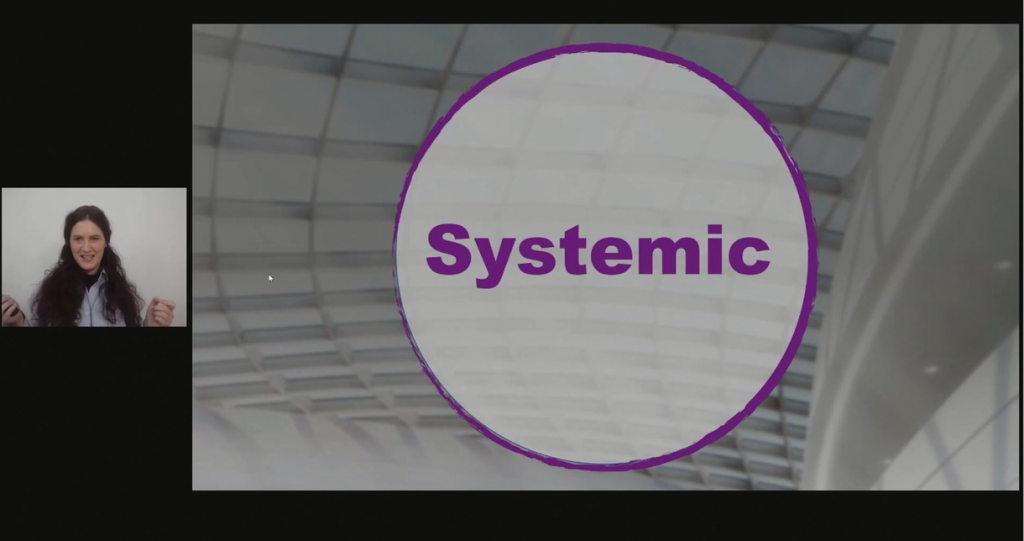After her session on the systemic approach to problem-solving and crisis management at IBTM World Virtual, we sat down with Steff Berger, founder of VOBE_Inspires People, to find out more about how to use this approach.
We know you as a European conference specialist and MICE crisis manager. And now we’ve learned you are also a systemic coach and trainer. How come?
I work in the MICE industry because I’m passionate about people. And systemic coaching and training is all about people, about emphasizing each person’s value and expertise.
I’m very interested in understanding both individual and group dynamics, and I find it fascinating to explore how people can best work together in a team environment, and/or as part of an event.
Does it work to combine events, with crisis management and with systemic coaching?
I mainly work for European associations that organize large conferences of up to 20.000 pax. When working with such large numbers of participants, crisis management is vital for two reasons:
- It demonstrates a high level of accountability and responsibility toward all stakeholders.
- It helps protect your team, as well as the event’s reputation.
Though it might sound like a paradox, preparing your team for the worst actually helps them perform at their best in a crisis situation.
And when we approach these situations with a systemic mindset, we have the ability to evaluate and analyse ideas and situations from multiple perspectives. In my own work, taking a solution-orientated approach completely changed my mindset. I now think in terms of solutions and resources instead of focusing on problems.
From this perspective, systemic coaching is a perfect match for events and crisis management. Combining the systemic mindset with MICE crisis management gives event and conference teams all the training and tools they need to be crisis ready.
What is the systemic approach?
Instead of looking at situations from a linear/analytical point of view, systemic thinking involves taking a holistic approach. It focuses on complex interrelations and interactions in systems. These systems can be directly or indirectly related to each other in a common environment.
For example, we could say society is a system, but we also live in an economic system, and in a political system. Families and companies also represent systems.
According to the principles of systemic thinking, every system is made up of individual persons, who are systems in and of themselves. That is, each individual brings their own reality and point of view to any given situation.
What does systematic questioning entail?
Systemic questioning is a solution-orientated question technique. It starts with recognizing that each person’s response to a situation depends on their unique background and experiences.
As a systemic coach, I’m not part of an individual’s system—therefore I can’t have the answers. Instead of sharing my views or offering suggestions, I guide people toward finding their own answers, with the help of a solution-orientated question toolbox.
In other words, we can sum up the systemic coach’s approach like this: “I don’t know the answer. Since I’m impartial, I’m not going to share my opinion. The client is the expert. They’re capable of finding their own solutions—and my job is to guide them toward those solutions.”
See below for some specific examples of good systemic questions.
What is the best way to get your team on-board with this method?
The systemic mindset is a great tool to inspire your team to create new visions and develop exciting, never-tried-before ideas. By drawing on the expertise of each team member, the systemic mindset offers the opportunity to show how much you value their knowledge and experience. This approach expands people’s perspectives and encourages them to explore new possibilities.
One technique I often use to get teams on board with the systemic approach is the fishbowl—an exercise that helps create a safe yet playful atmosphere that gives rise to new ideas.
How does the fishbowl work? Though it’s possible to do it by gathering around a table, I prefer to do it a room big enough for team members to stand in a circle and switch positions (which helps them shift their perspective).
The fishbowl exercise is based on posing a question and exploring every possible answer. For example: What does good team communication involve? We start off by writing the question on an index card and putting the card in the middle of our “fishbowl” for everyone to consider.
Then we ask participants to share their ideas, saying anything that comes to mind and writing it on an index card. We also add these cards to the fishbowl. This way, we gather multiple perspectives on important topics, which we can discuss freely—and return to at any time.
Examples of good systemic questions
“How do you know when you’ve achieved your goal?”
This targeted question helps define your target state as well as paint a clear picture of what it looks like. The idea is to have the team come up with an image that motivates them. It’s also a hypothetical question, allowing teams to imagine a desirable solution(s) in this context.
“Have you ever solved a similar problem?”
With this resource-based question, you can normalise a challenge and help put it in perspective, guiding team members to the realisation that they’ve faced challenges like this before. If a team member has mastered a similar challenge in the past, this question helps remind them of their skills and resources, which they can draw on and apply in this new situation.
“What would you have to do to make the project fail completely?”
This paradoxical question, which team members generally don’t expect, is a fantastic catalyst for developing solutions. This type of question helps team members become more aware of their roles and influence on the challenge at hand. By articulating what they have to do to ensure the project fails, team members are likely to find approaches that lead to success.
How systemic questioning can help you prepare for future events
When you’re developing a systemic question catalogue, what factors should you consider?
I suggest starting with: What is the goal of your meeting or company?
From there, I recommend creating what I call a “goal question catalogue,” which includes “next step” questions. For example:
– What are the next steps?
– What is the final step?
– What could be a good first step?
– When do you know you’ve come up with all the necessary steps to reach your goal?
From a crisis management point of view, I suggest developing a question catalogue that focuses on the facts and on the decision-making process.
This is where we need to draw a distinction between the crisis management and systemic mindsets. In crisis management, we only consider the facts! At the same time, it’s helpful to incorporate the systemic mindset, taking into account individual realities and perspectives.
In this context, it’s important to ensure that we’re making decisions based on actual facts—not on individual opinions or perceptions. In other words, when we integrate the systemic mindset, we may have to call accepted facts into question, but we still want to base our overall approach on the facts.
Can you give an example of where this has worked in past experience?
One example that stands out is from a debriefing meeting at a large scientific conference.
Over the course of the debrief, we received feedback from the board, the scientific team, and conference delegates, who commented on the poor quality of the scientific posters many delegates had submitted. Conference decision-makers concluded that some participants’ lack of access to education and resources had led to the relatively poor quality of their research summaries.
We all understood the problem, but at that moment the debrief team couldn’t find a solution.
Most of the time, problems persist and/or reappear if we choose to avoid them or approach them in a haphazard way. Too often, we overlook what’s creating the problem—and what we can do to change it. If this does not work do something else – is one idea of the systemic mindset. Asking a simple question like: “How can we best support the conference participants with less access to education?” opens up new perspectives and brings us closer to solutions.
Which is exactly what happened! In the end, we designed an educational seminar led by scientific experts that showcased high-quality examples and best practices for putting together scientific posters. By searching for a sustainable solution to the problem, we crafted a response that was both creative and inclusive. This is what the systemic mindset is all about!


